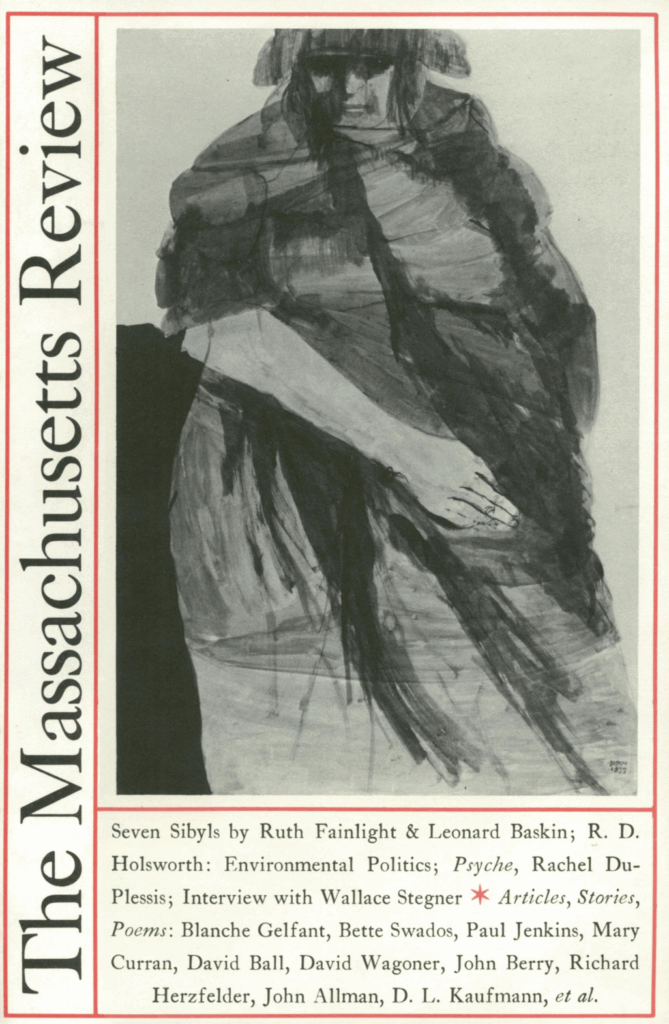Volume 20, Issue 1

FRONT COVER: Leonard Baskin
Provincial Sibyl
WATERCOLOR
Table of Contents
For Hugh MacDiarmind:
A portrait, Art by Leonard Baskin
The Eemis Stone, Poetry by Hugh MacDiarmid
from the London Times, September 11, 1978, “Mr. Hugh MacDiarmid: Creator of the Scottish Renaissance”
Recycling Hobbes: The Limits to Political Ecology, Non-Fiction by Robert D. Holsworth
Detroit Poem, Poetry by Tom Wayman
Living Off the Land; Making a Fire in the Rain, Poetry by David Wagoner
No Fear, Poetry by Mary Doyle Curran
Even Country Clubs Get the Blues, Fiction by Richard Herzfelder
The Hunter Invited, Fiction by John Berry
Kaethe Kollwitz Installs Her Statues at Roggevelde Cemetery 1932, Poetry by John Allman
Listen, Poetry by Bette Beller Swados
Psyche, or Wholeness, Non-Fiction by Rachel Blau DuPlessis
Seven Sibyls, Poems and drawings by Ruth Fainlight and Leonard Baskin
Revolutionary Turnings: The Mountain Lion Reread, Non-Fiction by Blanche H. Gelfant
The Round Moon, Poetry by Wendy Bishop
Time is Not Just Chronology: Interview with Wallace Stegner, by Bill Henkin
The Train That Sang All Day Through the Bush; Night Song, Poetry by Paul Jenkins
Turgenev’s Dialectic, Non-Fiction by David Ball
The Adventure of Dialectic; The New Realism, Poetry by Joan Retallack
Review: The Architecture of a Trilogy, Non-Fiction by Donald L. Kaufmann
Contributors
The memorial page to the great Scottish poet, Hugh MacDiarmid, is from a broadside published on the occasion of his week-long visit, with the poet Norman MacCaig, to the University of Massachusetts in April 1967. The portrait is by Leonard Baskin.
John Allman, who teaches at Rockland Community College, will have a new book of poems, Walking Four Ways in the Wind, published in the Princeton University Contemporary Poets Series this year.
David Ball, a teacher at Smith College, has published both poems and translations in a number of magazines and collections.
Leonard Baskin is the distinguished American artist; formerly in Northampton, Massachusetts, he now lives most of the year in the west of England.
After spending four years in India, John Berry now lives in California; he has published a novel, as well as Flight of White Crows: Stories, Tales and Paradoxes.
Wendy Bishop is the author of Second Nature, a chapbook of poems from Tideline Press.
Mary Doyle Curran teaches at the University of Massachusetts at Boston; her poems and stories have appeared in MR before.
Rachel Blau Duplessis is on the board of Feminist Studies and is a teacher at Temple University.
Ruth Fainlight, poet and short story writer, lives in London.
Professor of English at Dartmouth, Blanche H. Gelfant writes extensively on American literature; her The American City Novel was the first study of city fiction.
Now living in San Francisco and working on a novel on wizardry, Bill Henkin is a poet, editor and journalist.
Richard Herzfelder works at the Associated Press’s baseball desk in New York; his story in this issue of MR is his first published fiction.
Robert D. Holsworth teaches politics at Virginia Commonwealth University; his book Public-Interest Liberalism will be published this summer.
A member of the English Department at the University of South Florida, Donald L. Kaufmann has published essays and poetry in various journals, and is at work on a novel.
Paul Jenkins is one of MR‘s poetry editors and will soon have a book of poems published by L’Epervieu Press.
Joan Retallack‘s new play, The Defenestration of Prague, was recently given a reading performance at the New Playwright’s Theater in Washington.
Bette Beller Swados, an editor and literary agent, has completed a memoir, Five Years Later, published by New Letters, and writes poetry and fiction.
A co-editor of Colorado State Review, David Wagoner teaches at the University of Washington and is editor of Poetry Northwest.
Four collections of Tom Wayman‘s poems have been published in Canada; he teaches at Wayne State University.
Thomas W. Copeland, who from time to time wrote worthily for this magazine, died in Amherst on January 28, 1979. A renowned scholar of the eighteenth century, he was an authority on the writings of Edmund Burke. Previously a revered teacher at Yale and Chicago, since 1957 he was a much valued colleague at the University of Massachusetts.


